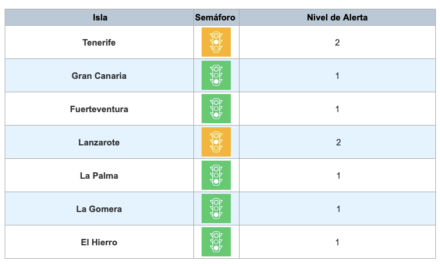For many, particularly in The Canary Islands, it was a bit of a bombshell to learn that Spain’s finalised Law of The New Normality, announced on Tuesday, will mean having to wear a mask everywhere, even when lying sunbathing on the beach or at the pool. The legislation comes into force throughout Spain this Wednesday, just ahead of the main four-day easter weekend. The latest Official State Gazette (BOE) tightens mandatory regulations for the use of face masks and makes very clear: it must always be worn, regardless of interpersonal distance, both outdoors and indoors, whether in public or private. And so, many are reporting that also includes places like the beach.
Most of the newly published law, however, is really no different from the rules that have been in place since last June, when the so-called lockdown confinement was de-escalated with a decree law to end the first State of Emergency.
 Despite the fact that here in the Canary Islands, until now, we have been able to follow our own regional regulation of these spaces, Spanish state standards supersede regional directives. This now means that the only exception to the use of masks, that had been allowed here on the Islands when lying down to sunbathe and so long as a safety distance of two meters was maintain, is now potentially ruled out, at least for the immediate and foreseeable future.
Despite the fact that here in the Canary Islands, until now, we have been able to follow our own regional regulation of these spaces, Spanish state standards supersede regional directives. This now means that the only exception to the use of masks, that had been allowed here on the Islands when lying down to sunbathe and so long as a safety distance of two meters was maintain, is now potentially ruled out, at least for the immediate and foreseeable future.
Spain’s central government will study whether it is necessary to “qualify” the newly published rules in a meeting this Wednesday
Spain’s Official State Gazette (BOE) published the new provisions, in a revision and clarification of the previous New Normality rules, in an attempt to further contain the coronavirus, in the face of what some health experts fear could be a European fourth wave of infection. Spain’s central government, however, will study whether it is necessary to “qualify” the newly published rules, at some point, in a meeting that will be held this Wednesday, together with the leaders of all 17 regional autonomous communities.
The Not-So-New Normality
The New Normality measures announced, however, are not, strictly speaking, new. As far back as last summer most of these stipulations were written into the laws being discussed in the Spanish legislature, however the administrative process to pass these measures into law takes many months, and so during the interim time it was left to regional authorities to implement, as promptly as possible, the basic tenets contemplated. This is, in essence, what has allowed for leeway in how to implement these measures on a regional basis. Now that the measures have passed into Spanish law, all regions are expected to confirm with the wording of that law, and any changes requested, will likely take time to enact.
Don’t Panic! This pandemic is still far from over.
All in all, the new law has been expected for many months, though most had contemplated the published legislation would try to take account of how the measures were actually working in practice, so for some this is seen as an oversight by central government, for others however, concerned about rising infections, and with one of the main national annual holiday weekends looming, this is being seen as a well timed reminder that this pandemic is far from over, and a necessary control measure to help ensure that healthcare services do not become overwhelmed, just as vaccine rollouts have finally begun to offer hope to millions of citizens eager to eventually overcome the devastating affect of more than a year of public health crisis and the subsequent economic collapse that is being experienced all across the world.
“Law 2/2021, of March 29, on urgent prevention, containment and coordination measures to face the health crisis caused by Covid-19” (“Ley 2/2021, de 29 de marzo, de medidas urgentes de prevención, contención y coordinación para hacer frente a la crisis sanitaria ocasionada por la COVID-19“) is a compendium of de-escalation measures that were already agreed back in June 2020, on the basis that the first decree of the state of alarm that the Government had approved has expired.
Spain’s Official State Gazette (BOE) published the Draft Law, known as The Law of The ‘New Normality’, which was approved on March 18 in the Congress of Deputies. Among the measures contemplated in the text, which enters into force this Wednesday will remain “until the pandemic ends”. In any case, masks will not be required for people who can verify that they have some type of illness or respiratory difficulty that may be aggravated using the mask or who, due to disability or dependency, would not be able to remove the mask on their own, or who present behavioural issues that make the use of masks unviable or counterproductive.
With the newly published New Normality law, the requirement to wear a mask in outdoor spaces is now applicable to all communities, which can no longer regulate their own exceptions or graduate how the law is applied.
The New Normality articles published yesterday clearly states: “People of six years of age and older are obliged to use masks (…) on public roads, in outdoor spaces and in any closed space for public use or that is open to the public”. This implies, for example, parks, beaches or swimming pools. Also when using “air, maritime, bus, or rail transport”, as well as in “complementary public and private transport of passengers in vehicles with up to nine seats, including the driver, if the occupants of the tourism vehicles they do not live at the same address”.
When travelling by sea, passengers on ships and boats, it will not have to wear masks when they are in their own cabin.
What else does this New Normality law say?
All in all this law is simply finalising the text of the rules that have already been in place since summer 2020, clarifying some of the points of contention to follow the best advice given to the Government of Spain, and regulates the application of those rules throughout all Spanish territories.
The law now states that sale of single surgical masks, not individually packaged, can only be carried out in pharmacies, guaranteeing adequate hygiene conditions that safeguard the quality of the product.
Sports, exceptions and health issues:
Current exceptions to the use of masks have been preserved in the new wording: individual outdoor sport and people who have disease or respiratory difficulty, aggravated by the use of masks or who, due to their situation of disability or dependency, would not be able to take it off on their own.
Force majeure or situations of necessity are included as an exception or when, due to the very nature of the activities, the use of the mask is not compatible, as already stated in previous legislation.
Going to work
People who present symptoms compatible with COVID-19 or are in home isolation should not go to their workplace. If a worker begins to have COVID-19 compatible symptoms, they must immediately contact the telephone number set up by their autonomous community or health centre, and they must put on a mask and “follow the recommendations indicated, until their situation is assessed by a healthcare professional.”
Business owners, or the directors of the centres and other entities, must guarantee adequate ventilation and disinfection measures, and have water and soap or hydro-alcoholic gels available at all times for cleaning workers’ hands. Likewise, everyone must adapt working conditions to maintain an interpersonal safety distance of a minimum 1.5 metres (or adequate protective equipment, if that is not possible) and organise work schedules to avoid overcrowding.
Finally, business owners must “adopt measures for the progressive reincorporation in person to the jobs and the promotion of the use of telework when it is possible due to the nature of the work activity”.
No change for shops, hotels and shows
The competent administrations must ensure compliance by the owners of hotels, shops or cultural shows with the regulations for capacity, disinfection, prevention and conditioning that are determined.
They will have to ensure the necessary measures to guarantee a minimum interpersonal distance of 1.5 meters and avoid crowds.
Schools without crowds
Conditions must be guaranteed so that there is no crowding and that both students and workers can comply with “the indications of distance or limitation of contacts, as well as personal prevention measures.”
Sanitary system
The competent administrations must ensure the sufficient availability of health professionals with the capacity to reorganise them according to priorities at all times. They must guarantee of a sufficient number of professionals for the prevention and control of the disease, its early diagnosis, attention to cases and epidemiological surveillance.
La ley de “nueva normalidad” [The Law of The New Normal] https://t.co/Kq7YZaY7up
— Miki&Duarte (@MikiyDuarte) March 31, 2021
During the New Normality legislative final debate in Congress, the Lower House of the Spanish Parliament, the Cortes, the Health Minister, Carolina Darias, stressed that this law will “allow progress in the control of the pandemic and also in functions of surveillance, inspection and control of cases.”
“This rule will be central to the management of the pandemic until it’s end. It includes a good part of the commitment acquired during the management of this painful crisis. It is called to be a source of knowledge for those who have to make similar decisions in the future”, said the minister in defence of the move.
Guillermo Díaz, from the Ciudadanos party, used the opportunity to highlight the incorporation of an amendment from his party for the suspension of the medical inspection visa for the prescription of triple therapy in the treatment of patients with chronic obstructive pulmonary disease (COPD), throughout the pandemic. “It will avoid bureaucratic treatments to access the best of treatments,” he celebrated. Keeping in tune with the Minister of Health, Díaz defended the need for this law: “We cannot face a pandemic again with royal decrees, except to qualify a rule that already exists.” In any case, he demanded that the Executive “propose to establish legislation that allows a better response to a situation like this in the future.”
Laura Márquez, from Unidos Podemos, part of Spain’s governing coalition, said she was also satisfied with the incorporation into the legislative text of an extension to research contracts during the pandemic, but insisted that those working to combat the pandemic should have proper work full time contracts saying “it is necessary to address the problem of temporality in scientific research.”
“Even people who are researching vaccines in our country have temporary contracts. We must guarantee the stability of our scientists, really, without cheating or cardboard [cutouts],” she added.
The opposition PP deputy Ana Pastor, herself a former Minister of Health, said that she regretted that the New Normality document does not incorporate any of the 45 amendments presented by her main opposition group. “Never before has the parliament been so ignored as in this legislature.” she said. “Decrees have become the norm, as has happened with this one. They have not accepted any of the 45 amendments from my party. Do you not realise that this decree arrives just as it [was originally suggested], that it has only incorporated five amendments?”, she pointed out by way of example. Pastor criticised that the Government, saying that this law, “has been unable to incorporate what the health system urgently needs.” She demanded to know “Why have they not supported our amendments?”
PSOE’s deputy Carmen Andrés Añón replied that the PP amendments were “very far” from the “nature” of the guidelines, since “they intended an exhaustive regulation of all foreseeable possible and impossible situations, and in this way would handicap the Inter-territorial Council in its decision-making “.
“In addition,” she said “they raised a clear conflict of powers with the autonomous communities. They were very far from the Constitution and the spirit of the law,” she concluded.












